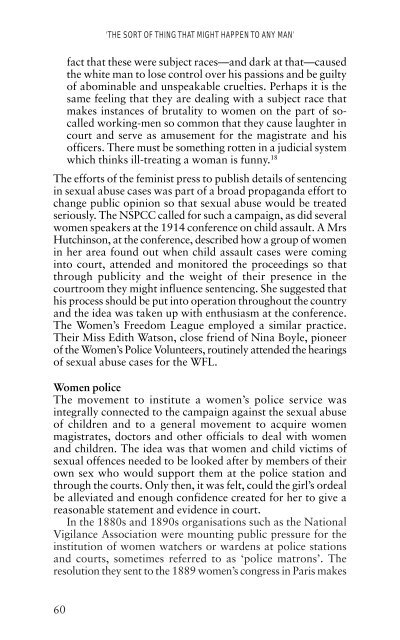The Spinster and Her Enemies - Feminish
The Spinster and Her Enemies - Feminish
The Spinster and Her Enemies - Feminish
Create successful ePaper yourself
Turn your PDF publications into a flip-book with our unique Google optimized e-Paper software.
‘THE SORT OF THING THAT MIGHT HAPPEN TO ANY MAN’<br />
fact that these were subject races—<strong>and</strong> dark at that—caused<br />
the white man to lose control over his passions <strong>and</strong> be guilty<br />
of abominable <strong>and</strong> unspeakable cruelties. Perhaps it is the<br />
same feeling that they are dealing with a subject race that<br />
makes instances of brutality to women on the part of socalled<br />
working-men so common that they cause laughter in<br />
court <strong>and</strong> serve as amusement for the magistrate <strong>and</strong> his<br />
officers. <strong>The</strong>re must be something rotten in a judicial system<br />
which thinks ill-treating a woman is funny. 18<br />
<strong>The</strong> efforts of the feminist press to publish details of sentencing<br />
in sexual abuse cases was part of a broad propag<strong>and</strong>a effort to<br />
change public opinion so that sexual abuse would be treated<br />
seriously. <strong>The</strong> NSPCC called for such a campaign, as did several<br />
women speakers at the 1914 conference on child assault. A Mrs<br />
Hutchinson, at the conference, described how a group of women<br />
in her area found out when child assault cases were coming<br />
into court, attended <strong>and</strong> monitored the proceedings so that<br />
through publicity <strong>and</strong> the weight of their presence in the<br />
courtroom they might influence sentencing. She suggested that<br />
his process should be put into operation throughout the country<br />
<strong>and</strong> the idea was taken up with enthusiasm at the conference.<br />
<strong>The</strong> Women’s Freedom League employed a similar practice.<br />
<strong>The</strong>ir Miss Edith Watson, close friend of Nina Boyle, pioneer<br />
of the Women’s Police Volunteers, routinely attended the hearings<br />
of sexual abuse cases for the WFL.<br />
Women police<br />
<strong>The</strong> movement to institute a women’s police service was<br />
integrally connected to the campaign against the sexual abuse<br />
of children <strong>and</strong> to a general movement to acquire women<br />
magistrates, doctors <strong>and</strong> other officials to deal with women<br />
<strong>and</strong> children. <strong>The</strong> idea was that women <strong>and</strong> child victims of<br />
sexual offences needed to be looked after by members of their<br />
own sex who would support them at the police station <strong>and</strong><br />
through the courts. Only then, it was felt, could the girl’s ordeal<br />
be alleviated <strong>and</strong> enough confidence created for her to give a<br />
reasonable statement <strong>and</strong> evidence in court.<br />
In the 1880s <strong>and</strong> 1890s organisations such as the National<br />
Vigilance Association were mounting public pressure for the<br />
institution of women watchers or wardens at police stations<br />
<strong>and</strong> courts, sometimes referred to as ‘police matrons’. <strong>The</strong><br />
resolution they sent to the 1889 women’s congress in Paris makes<br />
60

















